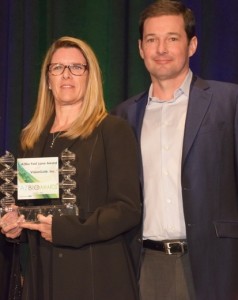Partnership Would Combine Company’s Patented Technology that Detects Pre-cancer of the Lungs with Drug Treatment that Prevents Cancer

VisionGate president, Scarlett Spring, receives the 2015 AZBio fast lane Award on behalf of the VisionGate team.
PHOENIX, Ariz. (January 7, 2015) – VisionGate, Inc., an emerging biotech company in the early lung cancer detection space today announced it has acquired exclusive rights to the University of Colorado’s patent for the use of the drug Iloprost in the prevention of lung cancer, making it one of the first companies to evolve from a diagnostic company to a synergistic diagnostic and therapeutic company.
VisionGate’s revolutionary, non-invasive test for lung cancer, LuCED®, recently delivered blinded study results demonstrating 92% sensitivity to lung cancer and 98% specificity. LuCED also has indicated an ability to detect various tumor types and stages of lung cancer, including Stage I and even dysplasia (precancerous cells). The high-risk lung cancer market includes 9 million Americans, but there is a need to help an additional 26 million who don’t fall within the CMS-defined, high-risk market segment.
Meanwhile, researchers at the University of Colorado Anschutz Medical Campus have discovered that Iloprost – a drug currently utilized for the treatment of various lung diseases such as pulmonary arterial hypertension – in a successfully completed Phase II clinical trial, demonstrated a 20 percent reduction of overall dysplasia in former smokers and a 40 percent reduction in the protocol compliant group. According to University of Colorado Anschutz Medical Campus professor and director of the NCI Lung Cancer Specialized Program of Research Excellence (SPORE) Dr. Paul Bunn, it not only repairs smoking-caused lung damage in former smokers, but as demonstrated in other cancers, the reversal of the precancer condition called dysplasia can prevent cancer.

Dr. Alan Nelson, Chairman and CEO of VisionGate was honored in 2015 by the Phoenix Business Journal with the Healthcare Heroes Innovator Award.
“We are ushering in a new era that boldly attempts to eradicate lung cancer, the world’s #1 cancer killer,” VisionGate Chairman and CEO Dr. Alan Nelson said. “For years, VisionGate has focused on the early detection of lung cancer where we have become the technology leader in non-invasive cell-based early detection. For the first time, we can now detect the pre-cancer condition and provide a chemoprevention therapy to reverse it. Now more than ever, we are determined to make a lasting worldwide impact on this deadly disease.”
Together, VisionGate and the University of Colorado Anschutz Medical Campus will continue the work being conducted as part of the SPORE grant. Next steps include conducting a Phase IIB validation trial where LuCED is compared with biopsy, leading to the Phase III trial.
“We are excited to accelerate the Phase III trial for Iloprost with LuCED as the diagnostic tool to help find those patients with dysplasia,” Dr. Bunn said. “We are highly encouraged by the results of our Phase II trial on Iloprost, and now the possibility of combining Iloprost and LuCED could be game changing.”
“The Lung Cancer SPORE is a National Cancer Institute Center of Excellence,” University of Colorado Anschutz Medical Campus professor and co-principal investigator of the SPORE Dr. York Miller said. “The first SPORE in the U.S. to focus on lung cancer, the program was created to do the work that is pivotal to understanding and eradicating this deadly disease.”
Dr. Nelson will make VisionGate’s first public statements on the Company’s new direction at next week’s Biotech Showcase™ 2016 in San Francisco. He is slated to present on Monday, January 11, 2016 at 2:45 p.m. (Track A – Hearst) at the Parc 55 San Francisco Hotel.
VisionGate is headquartered in Phoenix with a Research & Development office in Seattle, Washington. Its LuCED test is being offered as a Laboratory Developed Test (LDT) exclusively through the VisionGate Biosignature Laboratories, a Clinical Laboratory Improvement Amendments (CLIA) licensed laboratory in Phoenix, Arizona. For more information about VisionGate, visit www.visiongate3d.com.
###
About VisionGate
VisionGate, Inc. is led by Dr. Alan Nelson, physicist, bioengineer and entrepreneur who previously developed the world’s first and only automated screening test to detect cervical cancer, marketed today as FocalPoint by Becton Dickinson. The wholly owned VisionGate Biosignature Laboratories (VBL) offers LuCED, a non-invasive diagnostic test for early-stage lung cancer detection with exquisite sensitivity and specificity. This physician-ordered, take-home sputum test is processed on the world’s first 3D cell imaging platform, the Cell-CT, named aptly because it is similar in principle to taking a CT scan of individual cells, but using visible light without harmful radiation. With 128 patents in 13 countries, VisionGate expects to play a leading role in the battle against the world’s number one cancer killer. With the new exclusive drug patent license from the University of Colorado, VisionGate will drive the therapeutic market for chemoprevention of lung cancer and, ultimately, the eradication of this killer.
About the CU Technology Transfer Office
The CU Technology Transfer Office pursues, protects, packages and licenses intellectual property generated from research at the University of Colorado. Tech Transfer provides assistance to faculty, staff and students, as well as to businesses looking to license or invest in CU technology. For more information about technology transfer at CU, visit www.cu.edu/techtransfer.
About CU Cancer Center’s Lung Cancer SPORE
Established in 1992, the University of Colorado Cancer Center’s Lung Cancer SPORE is a National Cancer Institute-funded program that aims to fast-track basic research findings to cancer patients and people at risk for lung cancer. Located at the CU Cancer Center on the University of Colorado Anschutz Medical Campus, the Lung Cancer SPORE is funded from 2014 through 2019 on a five-year grant totaling $12.5 million.
The Center’s goal is to bring new ideas from the laboratory to the clinic and from the clinic to the lab that can improve survival and quality of life, while reducing the number of people who get lung cancer and who die from the disease.
